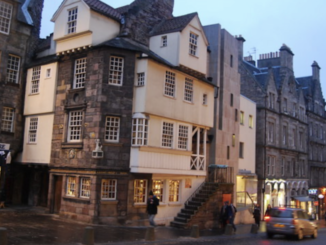The rooster started crowing at 3 am, which then set the dogs off. The barking went on for a while then a motorbike without a silencer went roaring past. It must have been 3-45am when I fell asleep again, only to be woken at four by a knock on the bedroom door and a whispered exclamation that it was time to get up.
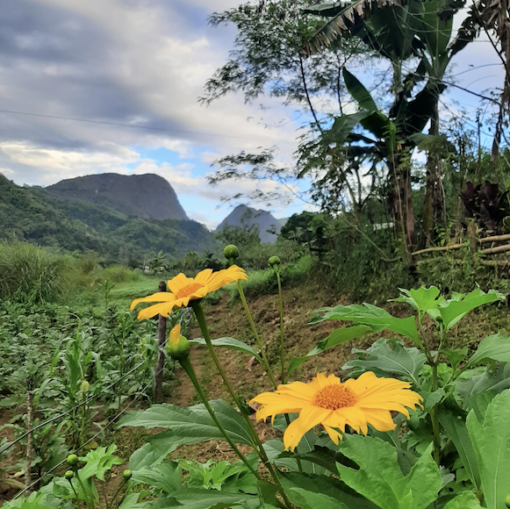
Breakfast was a simple affair of salted eggs and fruit accompanied by a strong black tea spiked with calamansi. As I ate at a rattan table on the veranda a house lizard ran across the ceiling and cast a lazy eye at the dusty strip-light, but there was nothing there to fire his sticky tongue at, so after a few seconds he scuttled away.
Sunrise was still two hours away and it was already over thirty degrees in the shade. In the kitchen, cool boxes were being filled but it was not my domain and so I kept well clear. I have learned that getting up early is a total subterfuge. There are moments of great activity followed by lethargy. it would have been nice to have an extra hour in bed and still be ready in time.
The car is loaded and leaves the house at 6 am. A few minutes later we slip onto the Rodriguez Highway where some of the smaller stores are already open. The traffic is relatively light and at the municipal market drivers are lounged across their tricycles in the vain hope that they will be called into action. It takes a little over thirty minutes to reach the edge of town and start the climb to Wawa Dam. On the way there are squatters houses, recycling centres for household junk and wayside stalls selling guyabano, watermelon, papaya and banana.
***
Wawa Dam was built by the Americans in 1909 as a pumping facility and sits in a gorge between Mount Pamatinan and Mount Binacayan on the Marakina River. Local folklore dictates that the gorge was made by a giant called Bernardo Carpio who cleaved the mountain in two to escape Spanish soldiers. At the lower level there is what appears to be a footprint pressed into the limestone but the story seems a little muddled in that Bernardo Carpio is mentioned as a Spanish giant in Don Quixote.
There is also a legend that the giant displeased the gods and was manacled in a cave and only managed to escape by pushing the two mountains apart.
Either way the dam was in use until 1968, the only source of water for Metro Manila, before it was superseded by the Angat Dam. Today it forms part of the Pamatinan National Park which contains some of the most challenging rock climbs in the country.
***
From the municipal car park there is a small track which leads by a series of steep ascents to Wawa Dam. The lower part skirts the river and passes through an avenue of stalls where supplies can be bought by those staying in the bamboo cottages by the river. At the mid-point, it is necessary to pay an admittance fee of 20 pesos (30p) and by so doing you are entitled to a view which is priceless.
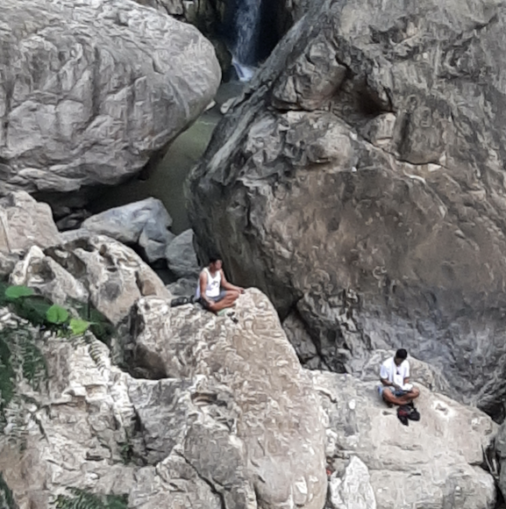
At a little after 7 am two men have descended into the gorge & climbed mid stream onto pinnacles of limestone. They can at once be seen as small specks against a mightier landscape and somehow seem closer to nature when they adopt the lotus position and meditate. In England I would probably have laughed at such spiritual nonsense and yet here, against the towering peaks it all seems quite plausible to reach out in such a manner to a superior force.
On the final phase of the ascent there is a tunnel formed out of the bastions which once supported a bridge. It is here, blinking from shade to light, that you catch the first glimpse of Wawa Dam. In fact you can hear the thunderous roar before you actually see it.
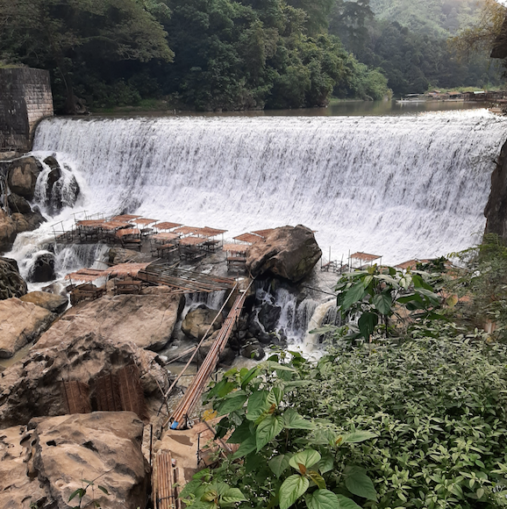
The shimmering white water spills over a parapet which is 85 metres across with a drop of 15 metres. it is even possible to climb down a rope ladder and across a series of bamboo bridges to sit in the waterfall itself.
Every day fifty million litres of water flows over Wawa Dam. There is even talk about it being recommissioned to supply water to satisfy the needs of an ever-increasing population in Montalban and beyond. This will probably not happen, especially if the environmentalists get their way.
Above the waterfall is a gravel foreshore where the boats await. The patch of land is surrounded by little huts which can be hired for picnics. There is even a bar, complete with a karaoke machine, for those who want to drink San-Mig and warble their own melancholic versions of Western and Tagalog classics. It is a happy place.
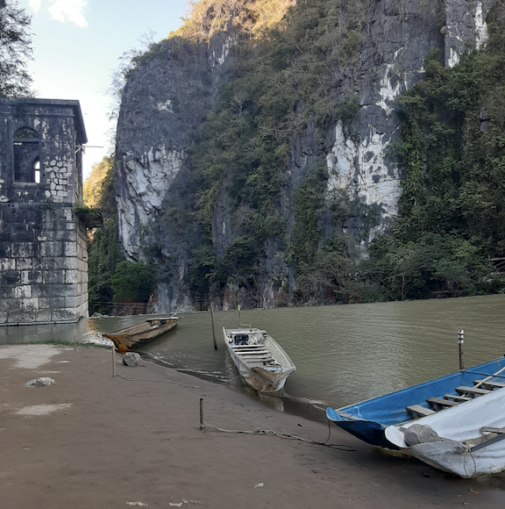
We take a boat up river towards Antipolo. Sometimes we ride at breakneck speed and sometimes, as the boat scrapes the shallows, we are reduced to a much slower pace. The air is refreshingly clean and the views nothing short of spectacular.
The pilot takes particular pleasure in rocking the boat to create whoops of concern that we might all end up in the Marakina River but we arrive at our destination with nothing more than wet feet as we wade through the shallows to reach our destination.
Sison’s farm sits on a grassy knoll a hundred yards from where we disembark. To get to it we cross the shale and pass through a field of aubergines before climbing the stairs to a grassy quadrangle surrounded by banana trees and clumps of bamboo. In our party is a midwife who has delivered most of the children at the farm and in the hamlets beyond. She is greeted like a long-lost relative and we are soon surrounded by a sea of smiling faces.
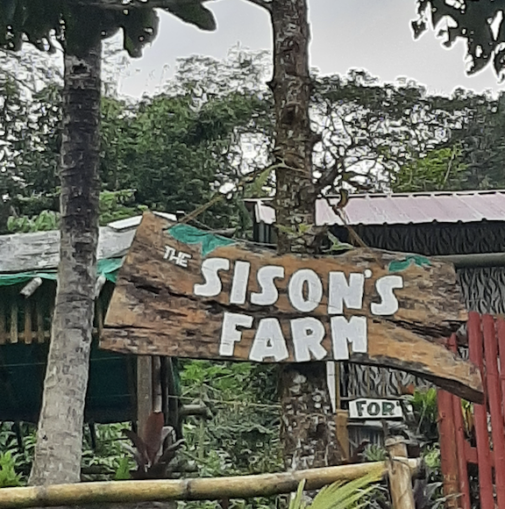
After coffee and morish glutinous rice cakes, the women set about preparing lunch. From the nearest hamlet a girl brings charcoal and a barbecue is lit. While waiting for the meal I am taken to see a plantation at the top of the hill. To get there we must climb 500 steps and my guide tells me that he usually runs up with a 25kg bag of cement and runs down with a large hand of bananas.
I am much more sedentary and am pleased with a slow and steady progress which in the heat still has me gasping for breath before we reach the top.
The bananas are of a variety which are boiled until they become sweet and sticky. They will be transported by river the following day to the wholesale market near Tay-Tay along with the latest crop of aubergines.
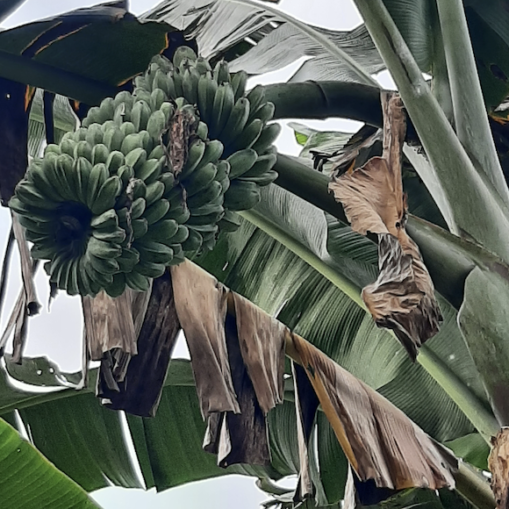
By the time we return, lunch is almost ready and a table has been set with a banana leaf tablecloth. There are glasses, a pitcher full of ice & bottles of Coca-Cola Zero.
There are however no chairs and no cutlery. We are to eat standing up and with our fingers.
The meal consists of barbecued fish and pork served with rice, salad, pickled papaya and a fiery dip of soya sauce mixed with rice vinegar and crushed red chillis.
It is a lunch of great simplicity but with intense flavours. The pork is charred and incredibly succulent, the fish is delicate and falls from the bone, the aubergines were on the plant not an hour ago and taste divinely sweet.
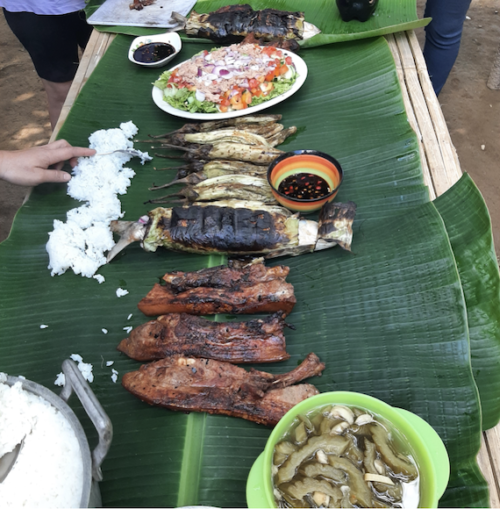
After the feast I meander down to the river and pick my way upstream. The mountains under a cloudy sky look close enough to touch and the river is dressed in an emerald hue.
Returning I find most of the party asleep in a nipa hut and so, for the first time in my life, I take to a hammock under the trees and rock myself to the rhythm of the day. In no time at all I fall into dreamland.
I awake maybe an hour later and a little after that we prepare to leave. The families and children come down to the farm and lead us to the river where a boat is waiting.
Before we depart I look across the river to the lush vegetation and the mountains beyond. It is a place of great beauty requiring nothing more than limited means. Many houses have no electricity, there is no wifi, no phone signal and hardly any fripperies.
I remember thinking that if it gets too unbearable in modern Britain then there are far worse places to end out my days. It could in fact be my new found Eden.

© text & images AÑO NUEVO 2024



